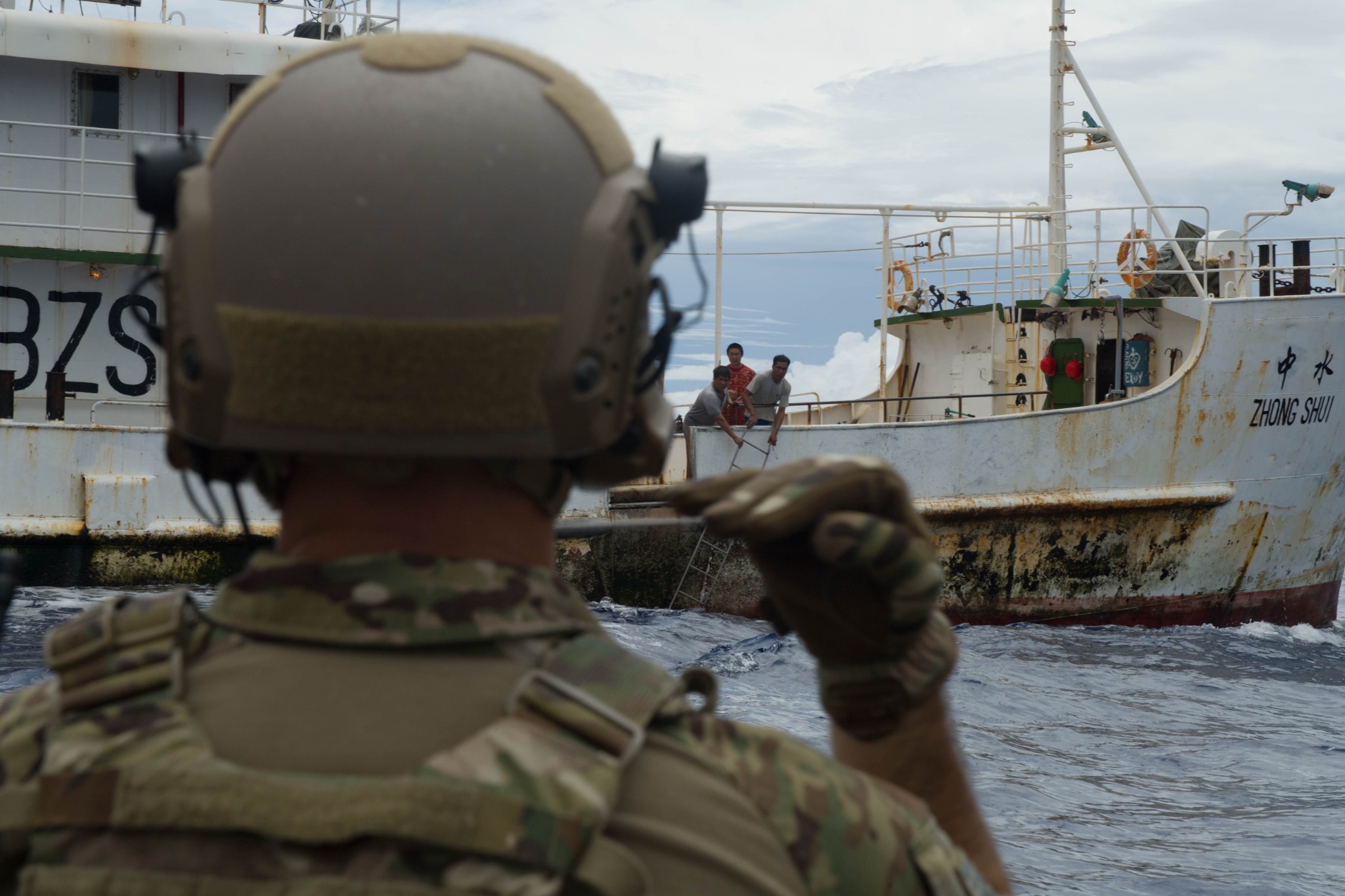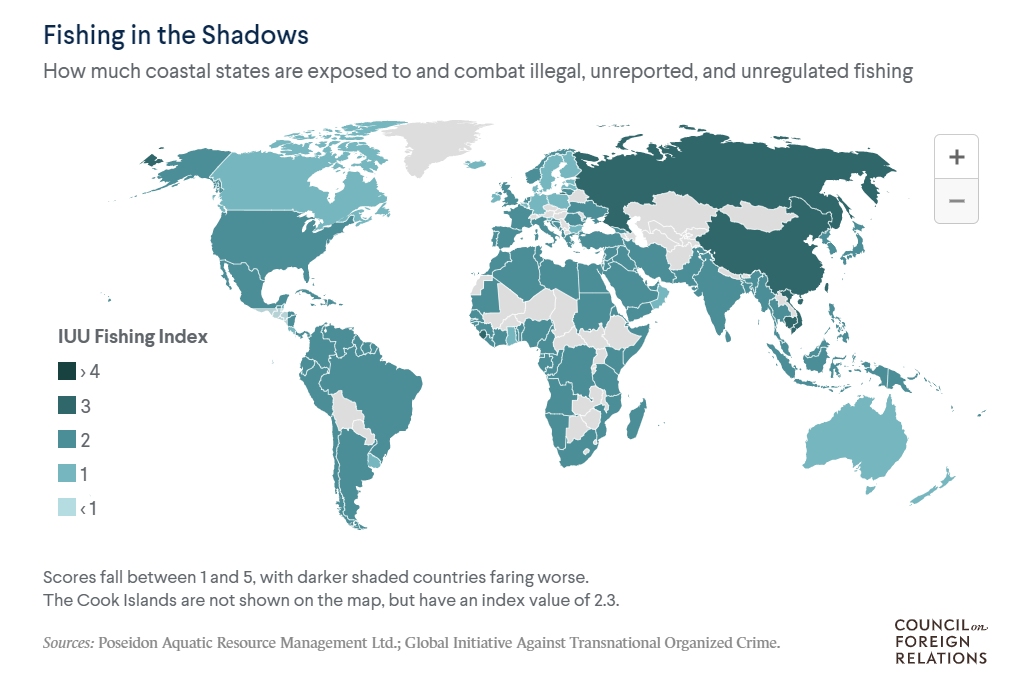 U.S. Navy photo by Petty Officer 2nd Class Bryan Jackson
U.S. Navy photo by Petty Officer 2nd Class Bryan Jackson
5 Ways IUU Fishing Threatens National Security
As of 2020, the U.S. Coast Guard declared Illegal, Unreported, and Unregulated (IUU) fishing as the leading maritime security threat due to the expected deterioration of fragile coastal States and increased tension among foreign-fishing Nations, which, if left unchecked, would threaten geopolitical stability around the world.
IUU fishing is the practice of fishing with disregard for maritime and fisheries laws or regulations. Illegal fishing refers to any fishing occurring in violation of applicable laws and regulations. Unreported fishing encompasses fishing activities that are not reported or misreported to relevant authorities. Unregulated fishing is defined as occurring in areas or for fish stocks for which there are no applicable conservation or management measures. Such fishing activities are conducted in a manner inconsistent with conservation measures set under international law. Fishing activities are also unregulated when occurring within the boundaries of a Regional Fisheries Management Organization (RFMO) and carried out by vessels without nationality or by those flying a flag unrecognized by the RFMO.
Domestic or foreign, artisanal or industrial vessels can commit IUU fishing anywhere from lakes and rivers to coastal states’ exclusive economic zones (EEZs) – extending 200 nautical miles from their shorelines – and in international waters (the high seas). It occurs on both small and large scales – accidentally or out of opportunism by subsistence fishers or through coordinated efforts to profit from the violation of laws and regulations. IUU fishing is a low-risk, high-reward activity because it typically goes unnoticed, and the punishments are usually nonexistent or mild. However, it jeopardizes the health of the marine ecosystem and local communities.
Global losses due to illegal fishing are estimated to be up to $23.5 billion every year. Illegal fishing typically occurs in regions that pose less risk of being caught, such as Southeast Asia, but the sale of illicit catch extends worldwide. Studies show that upwards of 32 percent of U.S. seafood imports are caught illegally.
Listed below are five ways that IUU fishing threatens national security:
1. Facilitates transnational organized crime
IUU fishing vessels are often committing other severe crimes in conjunction with illegal fishing practices. According to INTERPOL, many large IUU fishing fleets participate in crimes such as money laundering, corruption, forgery, human trafficking, forced labor, and drug and weapons smuggling. Transnational criminals exploit poor fisheries governance to carry out nefarious activities at sea. These criminals can easily avoid detection and capture through legal loopholes, such as turning off their Automatic Identification Systems (AIS) or changing their flag state, and through the help of complicit actors, including governments, port officials, and banks.
2. A hotbed for human rights abuses
Human trafficking occurs alongside other criminal activities, especially in natural resource-based sectors that depend on cheap or free labor, such as farming or fishing. Large-scale IUU fishing is linked to human trafficking and, once aboard, to modern slavery, human rights abuses, and severe violations of labor and safety standards.
As media attention has increased in the last decade, more human rights abuses have come to light (see this, this, and this). In 2015, the New York Times series ‘Outlaw Ocean’ detailed forced labor on IUU fishing vessels. Later that year, The Associated Press published the Pulitzer prize-winning investigation “Slaves may have caught the fish you bought,” which exposed forced labor in the Southeast Asian fishing industry and led to the eventual release of more than 2,000 slaves. In the 2019 film Buoyancy, these abuses are depicted by following a 14-year-old Cambodian boy who becomes a victim of human trafficking when he is enslaved on a Thai fishing trawler. The vast ocean landscape can be a lonely and isolating place, denying the victims of abuse the means to raise the alarm.
3. Fosters economic security threats
One of the main drivers of IUU fishing is over-capacity due to heavy fishing subsidies in many places. According to the FAO, there were 4.6 million fishing vessels globally in 2014, 75% of which belonged to the Chinese fishing fleet. Chinas’ distant-water fishing fleet (DWF) is the largest in the world, with almost 17,000 vessels (1,000 of which use “flags of convenience” and are registered in other countries). Most of the Chinese fishing companies’ net profits come entirely from subsidies. With less than 15 percent of the original fish biomass remaining in Chinese waters, China uses subsidies, especially fuel subsidies, to expand its DWF to far away, more productive waters. However, China is one of many countries that subsidize unsustainable fishing practices. The result of these subsidies is too many vessels trying to catch less and less fish, and legal fishers, artisanal and industrial, are pushed further towards IUU fishing in an attempt to stay lucrative.
IUU fishing further threatens coastal and developing countries’ economies through lost or stolen revenue. Illicit vessels do not typically pay the associated fishing fees to the government or RFMO, whose resources are exploited. These losses extend beyond the direct payment from fish catch to income from post-harvest processing activities, which decrease with illegal transshipping. These losses are felt disproportionately by developing countries that rely more heavily on fish for GDP and subsistence livelihood. Furthermore, these countries do not have the funding or means to control and monitor illicit fishing activities, which allows the bad actors to take as they please.
4. Exacerbates environmental degradation
IUU fishing undermines any attempt at setting sustainable catch limits and marine reserve boundaries. As illicit fishing vessels avoid surveillance and enforcement, they often turn off their AIS and, in some cases, intentionally target marine reserves because the fish is more abundant within those ‘protected’ areas. The marine protected areas (MPAs) are almost meaningless unless backed up by strict monitoring and enforcement. IUU fishing also contributes to marine degradation through loss and damage of habitat, depletion of fish populations, modification of the food chain, and pollution resulting from overfishing and prohibited fishing gear. This destructive fishing also contributes to the incidental capture of protected, endangered, and threatened species such as turtles, sharks, albatrosses, and marine mammals. Further, IUU fishing will exacerbate the negative impacts of climate change on marine productivity, biodiversity, and ecosystem resilience.
5. Contributes to food insecurity
Climate change and IUU fishing will further degrade the marine ecosystem. In addition to climate change, the world population continues to grow, and demands for meat and seafood-based diets are increasing. Approximately 3 billion people globally rely on seafood as their primary source of protein. Climate change coupled with population growth and depleted fish populations threatens to diminish vital food supplies. The threat to food security goes hand in hand with the marginalization of coastal communities and subsistence fishers. Additionally, this threat of food insecurity underscores the disproportionate impact of IUU fishing on developing countries. Half the global catch, much of it taken from or near the waters of developing countries, is then turned into fishmeal to grow fish like salmon then sold and consumed in wealthier countries.
IUU fishing endangers food security, threatens livelihoods, degrades ecosystems, undermines the rule of law, is intertwined with transnational organized crime, and hurts economies. However, research on these threats to national security remains limited and fragmented. While there is growing awareness and attention on IUU fishing and maritime security issues, the groundwork for a cohesive cross-sectional response is lacking. IUU fishing is a complex issue involving many different actors and governments that requires an equally complex network of information sharing and international regulations to combat. Follow along with the American Security Project as we dive further into the threat multiplier of IUU fishing and propose actionable solutions to tackling illegal fishing in the U.S. and abroad.






